- Soil Association
- Farmers & growers
- Farming case studies
- Case study: Rob Atkin, Field Hall Farm

Rob Atkin, Field Hall Farm
Rob Atkin, Field Hall Farm
Field Hall Farm in Uttoxeter is a 1,160-acre mixed arable and beef farm transitioning towards using agroecological practices. Farm manager Rob Atkin produces the main combinable crops using a conventional low-impact system, while also managing a herd of 320 beef cattle on low-input grass. His focus is on doing what’s best for the environment and his business, aiming to improve soil health, water quality, and biodiversity, while stacking payment options to maximise profits.
Finding nature-based solutions for soil health and weed control
To improve soil health Rob has been on a journey towards minimum tillage. “We are on what we like to call a ‘tickle’ sort of till, which is just working the top 10-15mm of the soil and direct drilling into it.”
The transition to mi-till at Field Hall has largely been successful, though some fields have been easier to manage than others. However, one challenge has been dealing with grass-weeds, such black-grass. Rob says, “I think [it is] one of the pitfalls… yes we are not moving a lot of soil, but we are also getting these weed pressures.”
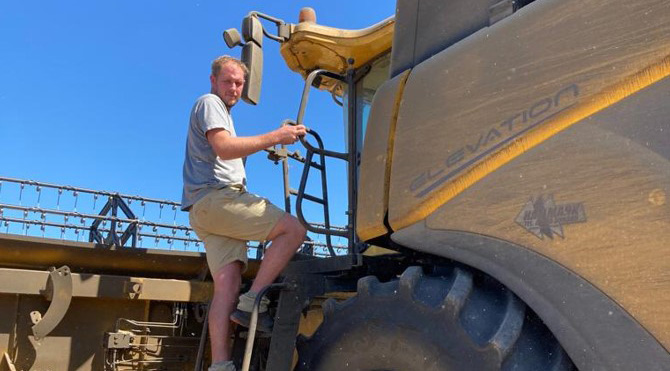
Rob Atkin, Field Hall Farm
Find out more about agroecological practices employed at Field Hall Farm
Weed build-up
To combat grass-weed build up, Rob introduced a wider crop rotation that included spring cropping, allowing the land to rest over winter. However, he was keen not to leave the land bare, so he planted cover crops and stubble turnips as an additional rotation. He says, “we trialled what worked well, how they acted as water pumps, and how well they broke up compaction," all keeping the soil alive and active.
A partnership with a local shepherd, who grazed his sheep on the cover crops and stubble turnips, provided an opportunity to introduce more livestock and increase green manure on the land. This collaboration also brought in additional rental income for the business.
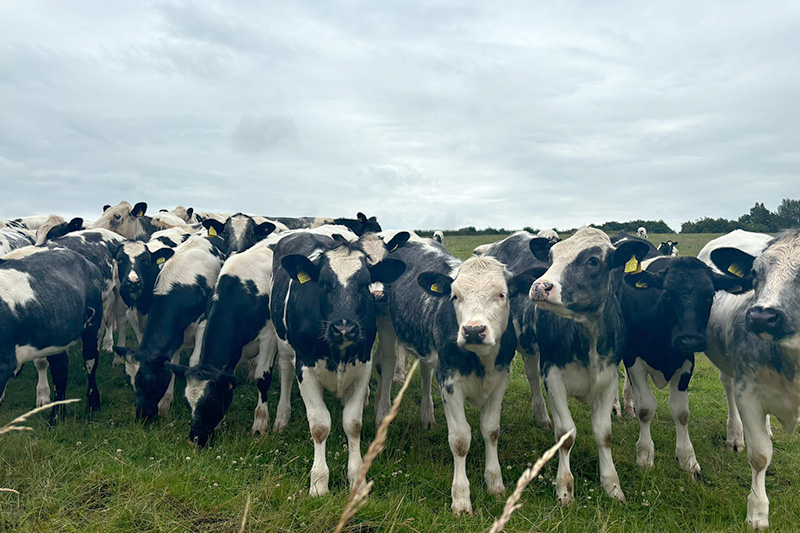
Cows on herbal leys
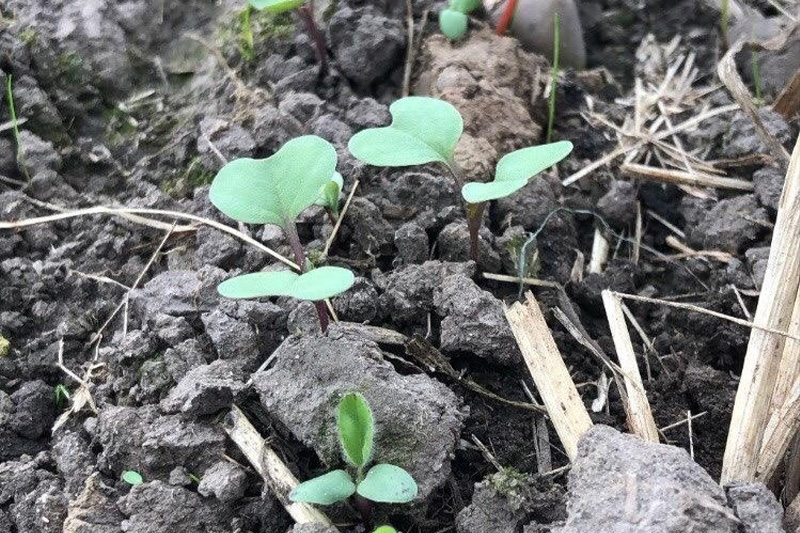
Emerging shoots, companion cropping
Farming practices that improve local water quality
The beef cattle are grazed on low-input pasture and herbal leys, which not only reduces input costs for the farm but also improves soil health and drainage through deeper-rooting vegetation. This supports the farm’s portfolio of water management initiatives with South Staffs Water.
To improve runoff water quality, Rob has introduced several measures: contour cropping (planting across slopes rather than up them), cover crops in key areas, 6m field margins, field bunds, and even changes in sheep grazing patterns - grazing from the top down rather than bottom up on hill slopes.
The goal, Rob explains, is to implement anything that slows water down, as this helps reduce sediment and nutrient transport. Slower water carries less and deposits more before reaching watercourses.
Encouraging biodiversity on the farm
At Field Hall, space for biodiversity and wildlife is integrated into the farm. Wide margins are complemented by in-field wildlife strips, creating corridors that allow beneficial species to thrive closer to crops, not just along the perimeter. Trees and hedges are also planted when grants and opportunities arise, with a focus on wide-based hedges filled with wild-bird food. These hedges are not just beneficial to the wildlife but can also provide shelter for the livestock and crops.
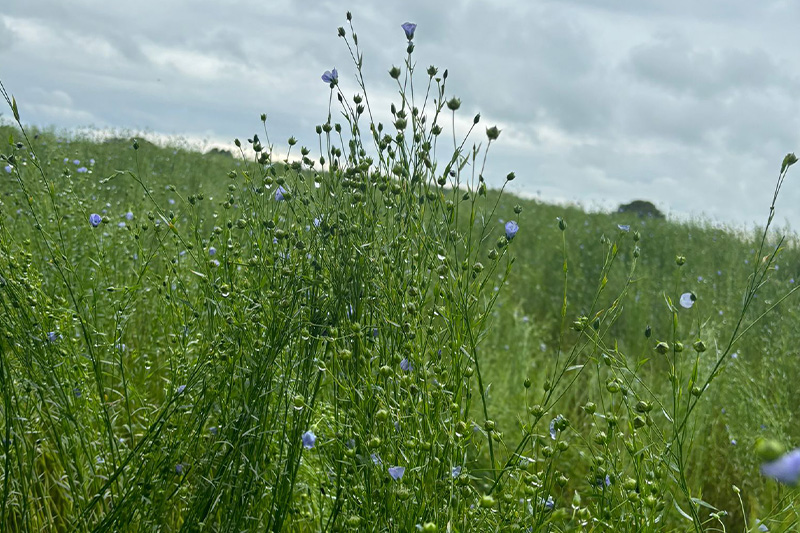
Diverse leys
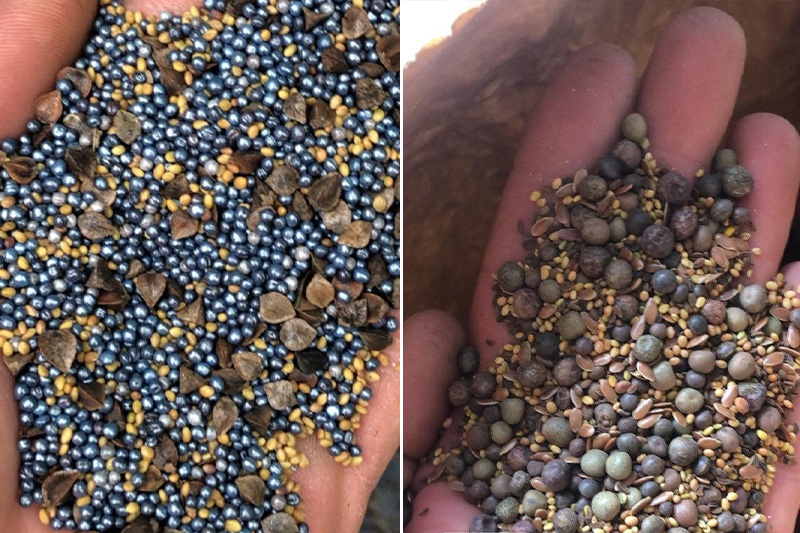
Seed mixes
A learning journey towards agroecology
Field Hall’s reduced input system, along with less reliance on heavy soil-moving equipment, has helped the farm become more profitable by lowering labour and equipment costs.
However, the increased frequency of extreme weather, uncertainty around the right payment schemes, and the challenges of transitioning to a new land management approach means life at the farm never stands still. There's a lot to learn and informed risks to take.
Rob's advice is, "Don't be afraid to try. You'll make mistakes - don't be afraid to show them and talk about them... If it doesn't seem viable or affordable, wait 12 months and try again when you can."
Find out more
We're using the term 'agroecology' in a very specific way in relation to farming, referring to 'whole farm' systems that benefit nature, animal welfare, soil health and climate resilience. This is just part of its full definition, which you can read more about here.
More low input farming advice can be found here.
Rob also features in our Farming and Land Use 'About us' film, talking about the changes he has made on the family farm.
